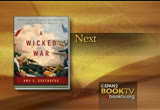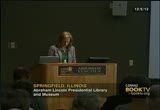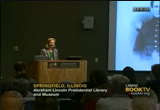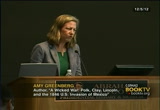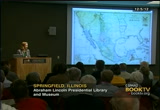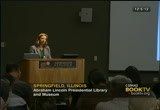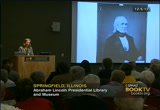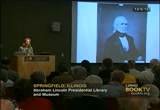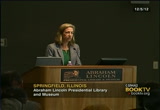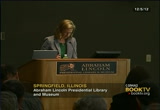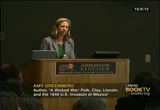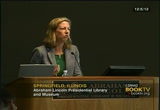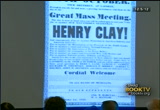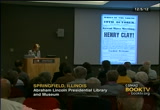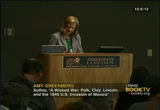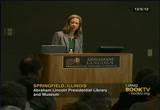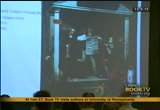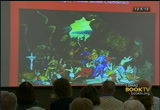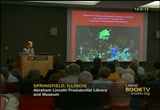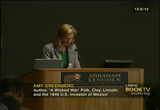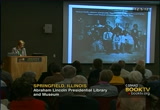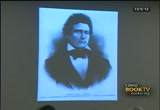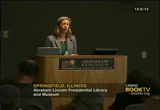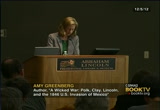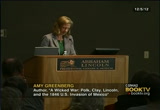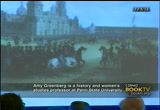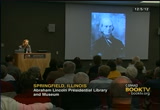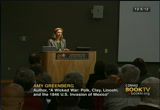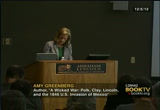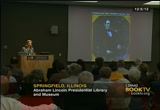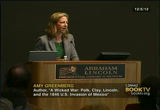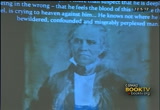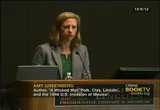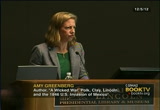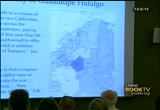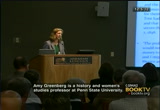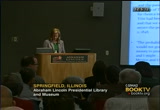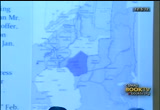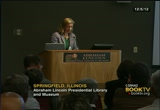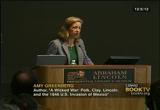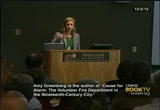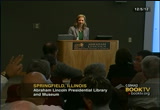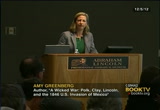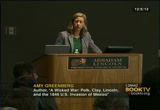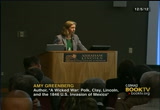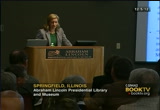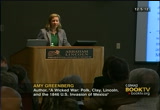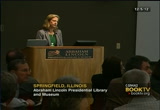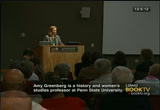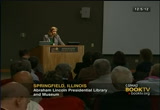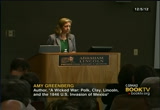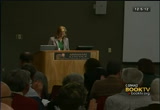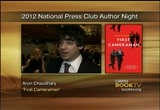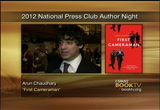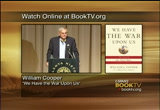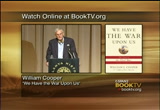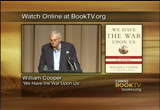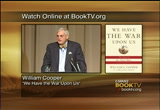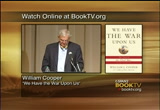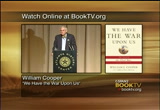tv Book TV CSPAN December 16, 2012 11:00pm-12:00am EST
11:00 pm
war in 1846. the author examines president decision to go to war and the rules then, abraham lincoln and henry clay played in the national debate. this is about an hour. [applause] .. >> what i would like to talk to you about today is my most recent book, "a wicked war: polk, clay, lincoln, and the 1946 u.s. invasion of mexico." the title, "a wicked war", is taken from a quote from ulysses s. grant.
11:01 pm
from late in his life, grant look back on his career and in his memoir he writes about the experiences that he had, good and the bad. it makes for good reading. one thing that grant spent some time talking about leaving his wife with his role in the us-mexico border of 1986 -- 1846. >> i found is a very moving quote. the fact of the matter is that grant was not alone in thinking that the u.s. invasion of mexico was somehow with it. one thing that i talk about in this book and i will talk about tonight is the evolution of the american public during the course of the u.s. and mexico
11:02 pm
war, from being really enthusiastic to largely turning against the war. i think the u.s. and mexico war of the moment of america's first antiwar movement actually coming into being. so there was antiwar sentiment during the revolution, and certainly during the war of 1812. that sentiment was limited. what you see happening in 1847 is a consensus, really, across the board. people from different regions of the country, soldiers in the field, officers, politicians, all of this fighting of the war that was being successfully waged in another country. so i think this is a very interesting moment in american history. and it takes place that people don't really know much about this timeframe. the u.s. and mexico war -- people don't write about it a lot. it doesn't have a big place in
11:03 pm
the historical imagination of americans. there is a number of reasons for that. it is often confused with the texas revolution or ignored altogether. when historians do talk about the us-mexico war, they tend to think about the war in relationship to the civil war. they narrated as sort of the first stop on the road to secession. arguing that the land it came from the close of the war was what really caused sectionalism to heat up. and in fact, that is all true. you can look at the moment that the civil war became inevitable, or you can look at it on its own terms, which is what i try to do in this book. what i was really interested in doing when i wrote this book was to show the impact of the war on individuals and families. the u.s. and mexico war had the highest mortality rate of any american war. 50% of soldiers who served in
11:04 pm
mexico for the united states died. 78,000 troops serve in mexico. it really had a big impact on people at home. so i really wanted to write a narrative that explored how people in the united states -- how the war impacted them and their families and some of the people that i talk about in this war are abraham lincoln, who makes his first major political speech, one that i found it was quite widely documented and discussed in newspapers. his first major speech in congress is about condemning the war. his first political stand is against the u.s. and mexico war. another person i talk about is john hardin, who some of you may be familiar with. he was part of a very important family in jacksonville. for a period of time, he was the leading whig politician in the state of illinois. not abraham lincoln.
11:05 pm
he was really under the shadow of john hardin before that happened. they are deeply affected by the u.s. and mexico war. now, let me tell you about the war. like most people come you probably don't know a lot about it. the north american invasion again with president james fulk. he sent troops into this area with the intention of starting a war. polk wanted more. polk actually went to his cabinet and said, i think we should declare war against
11:06 pm
mexico. and they said we really can't do that because the mexicans haven't done anything. we have sent 4000 american troops down so we can't declare war on mexico yet. when polk got defensive and that he needed, he went to congress on may 11, 1846. and he said that mexico attacked the boundaries of the united states and had shed american blood on american soil. this was a lie. everybody knew that it was a lie. the whig party, which was the opposition party, everybody in the party in congress knew that land where the soldiers had been sent, they had always been considered mexican rather than texan land. and a lot of congressmen say
11:07 pm
that the idea that this is american soil the blood has been shed on it is pretty dubious. but the fact of the matter is that everyone lines up and you can't really call it a declaration of war. so they are afraid of looking unpatriotic, suffering under the label of not starting the war. the mexican war is short. it is 20 months total come in only 16 months are actual fighting. as you will hear today, the war was not short enough for the american people. it was marked by a number of military successes by the united states, such as the battle of buena vista, where 5000 u.s. soldiers defeated an army under
11:08 pm
the general in santa ana between 15 and 20,000 soldiers. the numbers and the ratio in the battle of buena vista is astounding. the fact of the matter is that almost every battle, mexican troops outnumber u.s. troops. yet the u.s. won every single military engagement in this war with the exception of the battle in california, which americans prefer to think of as a skirmish rather than a battle. other than so other than that, americans won every single battle. there were three parts of the war. in the first eight, general zachary taylor secured northern mexico with key victories, including this one at buena vista. in 1846 in the first month of 1847. the second part of the war, he traveled a lot in kansas through new mexico, all the way to california. and unfortunately, neither of
11:09 pm
these tremendous victories bring what polk wants, which is peace in the securing of california and texas into the union. mexico refuses to surrender, despite the victories. so polk decides to invade central mexico. and he bombards veracruz and travel throughcentral mexico, securing the capital in the fall of 1847. in the eyes of americans, it was sort of a poor pollution that their side would win. and win easily. most u.s. citizens harbored racist beliefs about mexican man. foremost being that they were cowardly to fight. in fact, mexican troops fought hard come, as you can see in this rare print. you can actually get a sense of
11:10 pm
what their rendition wasn't what was happening. mexico lost all of these battles and ultimately lost the military side of the board because they had interior weapons and their leadership was terrible. mexico's government was internal. they were broke. there were various battles where there were no money. the army was supporting itself. because hostile american tribes in new mexico had so rabidly acted, there was little development in the northern mexico. now, on the mexican side, most of the army was made up of mexican troops. on the u.s. side, most soldiers were volunteers. it's very interesting. at the start of the war, support was so overwhelming, particularly in the midwest, that many men volunteered to fight and could actually be
11:11 pm
taken and gone to a regiment. overwhelming enthusiasm for the war. in fact, the midwest provides the most troops providing in mexico. a lot of people think it is the south, but it isn't. missouri and illinois provided the most troops to go to fight in mexico. nonetheless, support for this war was not universal at the beginning. here we have a campaign poster for henry clay, who was the whig nominee in 1834. his opponent in 1834 was james polk. and clay's opposes him in texas in 1834. because he believes it is going to result in war with mexico. i love this poster. i discovered that this was from a campaign appearance in indiana. if you look at the list as to why you should support henry clay, the first are typical whig
11:12 pm
economic positions. so the waves are generally the party of economic development in the united states in the 1840s. but when you get down to the fourth reason, you can see are you for or against the annexation of texas? are you for or against an unjust and disgraceful war with mexico? my favorite one, are you for or against dishonor and disgrace? this is what they are going to say. if you don't vote for henry clay, you're going to bring national disgrace upon the country, and we will be in a war with mexico. clearly, a lot of writing on the wall. in new england, at the start of the war, anti-slavery sentiment, which was spread in antiwar sentiment. pretty early on in the war, the massachusetts house of representatives states that the
11:13 pm
war is immoral and they will oppose it. they provide people who speak out against the war. and pretty strong terms. the opposition had remained limited to new england, it really wouldn't be different than what happened in the war of 1812. but what happened was new england stop being the only place where people protested the war, and we begin to see national movement grow. there are essentially four main grounds upon which americans oppose the war. the first one, which you can see clearly, is on the ground of morality. this was an unjust war, which would bring national dishonor on the united states. congressman joshua gittings of ohio repeatedly warned the house of representatives that in order to be patriotic, people had to descend from this aggressive and
11:14 pm
unholy war and the murder of mexicans upon their own soil, i can take no part, either now or ever after. he was very strong in his opinions. that was the kind of critique that you see, certainly by march of 1847 when the united states bombarded the town, leading to the deaths of a lot of civilians. there was an anti-mexican workers he was based on reality. the second grounds upon which people critique the war wore on the grounds of slavery. from what i just told you about, he was an evolutionist, but it was not just abolitionist or people in new england. they thought it wou make
11:15 pm
slavery spread and it would make slate colored stronger. again, it wasn't just those in new england who held his view. consider a popular print of the war. when you first look at it, it is kind of a neat image of the power of newspapers. this one was done by a well-known artist at the time. it looks like the image of people being enthusiastic about the war. they have just gotten news about the war in the newspapers. and in fact, the u.s. and mexico war was the first one where journalists traveled and were indebted with journalists who traveled with the troops. so this is the first war where people are getting immediate news about what is happening from a first-hand account of a journalist traveling with the troops. the look of the image a little bit more closely. i should tell you, first of all, that this gentleman was from baltimore and not new england.
11:16 pm
he places slaves at the front and center of the image. i think what they are asking readers to think about in the implications of slavery, if you look all the way to the image come you can see a guy that is tossing a match into a barrel. this is suggesting, what is mexico really going to do except for set off a firestorm? and this is an image from baltimore about the war. another major critique of the war have to do with what people saw as the impact of service of mexico on the american. people argued that it was making the american character wars, it was degrading american soldiers and turning them into the kind of people that we didn't want them to be. this critique became especially strong after reports of very bad behavior by american troops, and
11:17 pm
i see that happening about the middle of 1847. particularly in northern mexico, the volunteers who i told you about, they became extremely badly. they murdered civilians. they raped mexican women. there were reports of villages being burned down. general zachary taylor felt that he really couldn't control the volunteers. the volunteers were under control of their own commanders coming from their own towns. one of the things was they never really abided by the discipline that taylor expected in the army. so there is an image of a massacre of 25 mexican civilians by volunteers that are known as the rack and factories. this was painted by a soldier from illinois who actually plan to see this massacre happened. it was reported all over the
11:18 pm
united states. they were taking revenge on the people of mexico for the murder of one of their own. so they took these mexicans into a cave and kill them. this was a widely reported incident. but by no means was it exceptional. in fact a couple of weeks after this happened, there was another massacre that was similar that was perpetrated by texans. so this helped turn people against the war. it was initially claimed as not being true, and once the newspaper got verification of it, they actually wrote to all of the readers and said, let us know longer complain about mexican or verdi. the notion is no act of human cruelty should be perpetrated committed by our soldiery.
11:19 pm
so this is running in the american people. so perhaps while it spreads in america, this has to do with it. a lot of americans felt like association with mexicans would corrupt american manhood and degrade the united states altogether by watering down what americans believe to be their anglo-saxon blood through the incorporation of mexicans. south carolina's greatest orator and intellectual, who was a firm believer in need of the need of flavoring american society was a very active opponent of the war with mexico with mexico because he thought that mexicans do not belong in the united states. he said that i protest against such a people, ours is a government of the white man come
11:20 pm
and calhoun is hardly alone. a lot of americans felt that mexican land might be desirable, but having to take mexican people with it could pose a problem to the united states. with northern reformers making these critiques, one of the contributions that i think that we made was the role of soldiers and officers and what they played in this revolution. so this brings me to colonel john hartung of illinois. why have come to know very well after spending hours with his family in chicago. now, he was a former whig congressman, part of a wealthy and procedures kentucky family, he was related to henry clay. both through marriage and blood, tightly woven, a kentucky aristocracy. starting with the first men in illinois, he was volunteering to
11:21 pm
fight for the war before it started, he was repeatedly writing letters to stephen douglas. even though douglas was a democrat. and he already had a lot of military experience. he had bought in the black hawk war. and he actually was in charge of the mormons and state of illinois. he was a big military guy, a political guy, and he really wanted to buy mexico. he wrote letters to newspapers saying that this is our possible opportunity to gain california for the united states. and i will be the front of that movement. and in fact, he was. now, pardon is excited about the possibility of taking a lot of mexican territory and manifest destiny. when he gets to mexico, his views change pretty quickly and dramatically. when he gets to mexico, he writes about potential silver mines. and he says that the silver mines here are supposed to be
11:22 pm
the richest and mexico. and were only abandoned why the ignorance of the mexicans. and he said it would only require a little skill to make these valuable. but the longer he stayed there, the longer you like it. in december of 1846, just a few months after he arrived in mexico, he wrote his law partner that there is not an acre in 500 that a man would pay taxes on illinois. the people of mexico will. i've never seen a drunken mexican. that is the only good thing i can say about them. they are a miserable race with a few intelligent man. three quarters of the men or more are peons and treachery and deceit and stealing are the particular characteristics. it would make a miserable addition to any portion of the population of the united states. to another friend he wrote just a week later that the only difference between the peons and the slaves of the south is their color, and he says, as for
11:23 pm
making these peons voters in the united states, it should not be thought of until we give all indians about. these are his thoughts on what is happening in mexico. this tragedy occurred after only three months. he told a third friend that although i was for all of this mexico and having an annex to the united states, i doubt whether it is worth it. people are not better than the country. and so harding's evolution to his ego phobic person was not uncommon. it was shared by many. it was midwesterners who shared enthusiasm for the woes of mexico. but many decided it wasn't such a great idea after all. their exposure of but when people let them question the future manifest destiny. but general taylor pushed for a
11:24 pm
quick and tohe in the value of mexican territory to the united states. now, the national antiwar movement became particularly interesting after winfield scott's troops captured mexico city in 1847. here is an image of scott. if you look at the lower left-hand image, you can see a peon picking up a rock and preparing to throw it at the american troops. this is an image that expresses the extreme hostility of many people in mexico city. having their city occupied by american troops. initially, as you can imagine, americans were excited that their army had captured the capital of another country. but what began was actually a period of bleak occupations and it ended up being terrible for the army and the pro-movement of war generally.
11:25 pm
winfield scott's troops were subjected to daily guerrilla warfare by mexican forces and there was no end to the war inside because mexico still refused to give up. and at the same time, a lot of expansion in the united states, they began to argue that maybe the u.s. should not annex all of mexico. if you have captured all of the capital, people began to question whether the war should go on any further. the turning point in the creation of a national war movement occurs two months after scott occupies mexico city. henry clay gave a major speech in lexington, after the war. and clay had been out of the public spotlight since his terrible to feed by james k.
11:26 pm
polk in 1834. a defeat that was probably caused by the fact that he opposed the annexation of texas, which was hugely popular. unfortunately, henry clay not only had to suffer through that be, but his namesake and favorite son, henry clay turner, like john hartung, volunteered to lead troops to mexico. he was a leader of kentucky troops. so after his son's death come he becomes very religious. reporters traveled over 100 miles to hear his speech. the newly invented telegraph
11:27 pm
meant that within a couple of days of the speech being uttered by him, it was reported around the country. clay's speech touched on all of those grounds for opposing the war that i had mentioned. he said that the u.s. has lost its sterling reputation abroad. he talks about american soldiers being disqualified by returning to civil society. he says that this might cause the spread of slavery. and he also makes it clear that there are racial reasons to oppose the war. clay asked his listeners about any considerate man, those so different in race and language could be blended together in one harmonious mass. you know, after this rousing speech, clay called for mass meetings around the country to end the war. and people actually took them up on it. i have located over 30 meetings of support of clay's anti-war
11:28 pm
resolution from new jersey to maine. in this geographic scope consist of people who are meeting together in public forums and are saying that yes, we need to leave mexico and then this war immediately. except, i think it constitutes the first national antiwar movement in america in american history. so he wanted peace without any territory, which, of course, did not happen. now, just two weeks after clay's speech, the 30th congress convened in washington. guess who was there? abraham lincoln. he heard clay speech in lexington because he was visiting the town on his way from springfield to washington dc. he was visiting his wife's family in lexington. and this was a tremendous thing for abraham lincoln.
11:29 pm
lincoln had always idolized clay. he called him his ideal politician, and to have the opportunity to actually hear him speak was a huge thing for him. when lincoln was young, he carried around a book of clay's speech is. and when he was a young man and a legislator, he asked henry clay to come speak in springfield, and clay didn't come. this was his opportunity to meet the politician that he respected and admired the most. and he heard clay and his speech against the war. perhaps it isn't surprising that when he gets to washington, instead of talking about terrorists or any of the economic issues, that motivated him as a politician. and he decides to oppose the war. what are known as spot resolutions. so he gets up and called the president a liar for claiming that american blood was shed on american soil. he gives this list of reasons
11:30 pm
why it wasn't american soil. that is his first speech. the second national speech is a very dramatic attack on james k. polk and the attack on the war. the highlight of which was lincoln said that he more than suspects that he feels the blood of this war, like the blood of abel is crying to heaven. he knows not where he is. he is eager where older man. i love this image. this is an image of james k. polk from late in his presidency. and he basically worked himself to death in support of this war. he worked incredibly hard. you can see how much he aged in the picture, as i showed you earlier, which was taken at the start of the presidency. lincoln adamantly attacks polk. he said that his attacks were ignored largely. i found this was not the case by
11:31 pm
looking at newspapers. the speech that you see here was widely reprinted across the united states. this is lincoln's first taste of national acclaim and attention. and little did he know, that the president actually was confounded, and here's why. back in the summer of 1847, there was a diplomat named nicholas dress that negotiated with mexico. once he occupied mexico city and captured it, polk began to think that we should take more of mexico than the treaty stipulated. he wanted to see baja, california, in the united states. he wanted to see the rest of the united states and he had expensive design on what the united states should take from mexico, much more that he told nicholas to negotiate more. so he told him to come home. what ended up happening is that trist refused came that he
11:32 pm
refused to come home. as trist said, he wanted to make a treaty that was not exactly to mexico. so he made the treaty while lupe adolfo, despite the fact that he wrote his wife that he will probably never work in washington again. and polk was so angry that he withheld the pay of trist, and his family became an incredibly poverty-stricken family. it wasn't until after the civil war that trist got another position. it was near the end of his life and he was given a not very demanding position running a post office in virginia. but up until that point, he was broke and his family over
11:33 pm
terribly because of it. now, let's just kind of wrap this up and tell you what i think the antiwar protests, the context is. the top quote that i have is a quote from polk from january of 1848. this is what he said to his cabinet. he said at this point, he might be willing to accept a session of new mexico and california, as well as baja and the passage across this, it is paying a much less some than mr. trist is prepared to offer. so if you look at this map, which i have turned to show the importance of the negotiations, you can see various lines that demonstrate what people wanted to take. let's see if i can get this going here.
11:34 pm
so what that would have brought, an additional one third of the country of mexico into the united states than what ended up happening. unfortunately, on february 19, the treaty of guadalupe it also was signed. the mexican counterparts. polk decide that he has to accept the treaty. he said that the probability of the congress would not grant men or money to prosecute the war, and i might lose new mexico in alto, california. sadistic include, did the antiwar movement achieve its goals? i don't know that it was an extremely realistic position.
11:35 pm
this was clay's position. the anti-war movement in the war -- i think if i were education, both in congress and on the ground, forced polk to bring the war to a close. so i think that you can say that it did limit the territory acquisition. i do believe that it -- it definitely mobilize the public in support of bringing an american war to a close for the first time. i think it's important to acknowledge the antiwar movement that existed in the past. the bacon were, they could have real effects and limit the loss of life. so i think that he did all of these things. thank you very much. [applause]
11:36 pm
>> absolutely. >> [inaudible question] >> all right. sure. >> okay, so this is the top part of california, that when into evolution. this is what the united states wanted, and this is what polk wanted. down in here. okay, so he wants václav, california, then want to come down here and he wants to come along here. about a third of the way.
11:37 pm
11:38 pm
and the civil war had all of the thrilling battles of the us-mexico war. but also kind of a message that america could believe in, which was that we were reunifying the country by not talking about southerners here, but the victors in the war on that they were able to craft a narrative that was extremely uplifting. so it was more dramatic and it was a much bigger war and many more people were killed and involved. so that overshadowed it. the other important reason why people forgot about the mexican war, i don't think it fits in the narrative and americans tell themselves about their military involvement. if you think about the wars that americans like to commemorate, one thing i talk about in this book is ellen hardin were she gs
11:39 pm
on to found the daughters of the revolution in her later life. her thinking about the american revolution is that a war that will teach people patriotism. so she becomes prolific author and defender of battlefields in saratoga, and a very important national figure. she never talks about us-mexico war, even though her father being killed in that war was a defining factor in her life. i think the revolution, for a lot of americans -- that is a war that is about principle. then we have these other battles and wars that people are involved and that are not really that principle. certainly the us-mexico war was into that category. >> [inaudible question]
11:40 pm
11:41 pm
imported mexican labor. the mexican workers got here, they realized that the union was on strike. so there is a huge turnaround as far as attitude and, again, the people. >> there is, but there isn't a change in attitude. a lot of people in the united states are perfectly happy as long as they can be sent back to mexico once the labor was done. the program is really an incredibly unfair program to mexican laborers and really set a model for importation of other models that continue to this day. it was in terms of the weight of the mexican people -- you became part of the united states retreated -- it's a terrible
11:42 pm
story. the thing i found profound and sad, there are a number of mexicans who support the u.s. cause. they actually think that they are going to be better off under a u.s. government than they are under mexico's government. the fact is that mexico does not treat the residents of the northern territories very well. it is not provide them with protection of indian tribes. and a lot of these people in california actually come on board the u.s. cause and they support u.s. troops and provide horses for the troops and ammunition, and these people all lost their land. because although there are supposedly legal rights that are given to these people, the way that property disputes played out is in local courts. and those are incredibly racist against mexican people. pretty much everyone in california who is mexican and ends up losing their land. you see that basically it is not
11:43 pm
a happy story in any way. in terms of attitudes towards mexican people, i published an op-ed piece not that long ago, looking at the u.s. mexico origins of what republicans refer to as the latino immigration problem. if you look at what happens, the republican party looks at it and say we really need to change the way we talk about immigrants because it's costing us votes. the fact of the matter is that latinos voted overwhelmingly for democrats in this election. in a number of house races which were supposed to be tossups. because latinos in the area voted 70 and 75%. republicans said that we need to think about a way to think about the ongoing problem that people have. particularly in the areas that we are talking about here, which were taken from mexico at the end of the war, where the presence of mexican people make
11:44 pm
anglos feel extremely uncomfortable uncomfortable and leads to this anti-immigration rhetoric. very good points. >> i would like to ask you to comment in view of your observations on the antiwar sentiment that seems to prevail after the mexican war. why there seem to be such popularity associated with the filibuster movement. william walker invaded baja? >> yes, that didn't go very well. >> why was he so popular? it seems as though a different era, the new opportunity for expansionism -- how do you explain a? to i actually wrote a book about this. it is called manifest manhood and it is all about the support
11:45 pm
for filibusters. william walker is pathetic and very sad. he doesn't know what he's doing. but the truth of the matter is when he goes back to san francisco, and he is tried upon violating neutrality rules, he goes free. because you can't find a jury to convict him. a lot of americans still believe in manifest destiny. when walker gets to central america, he becomes a huge national figure. so there are a lot of people in america who really have these expansive views of what the united states can become. it's not an issue for the them to encompass all of central america, canada, perhaps even south america. this is what people think is going to happen. how do you deal with that situation? well, it's not a coincidence that william walker support slavery. so it is to bring african slaves
11:46 pm
into these areas, some people are talking about how we should inflate central americans themselves. it is a strange and unusual situation. i think that filibustering was uneasy with the us-mexico war. but by no means does this stop americans from starting to get more territory. i think the seeming ease with which the u.s. took the territory embolden expansionist as they we have that much of mexico, sure, we can go to central america, no problem. at the very back? >> [inaudible question] >> okay. >> the first question has to do with the immigrants coming to the united states during the 1840s. they have an opinion or
11:47 pm
observation about the war, and how did this affect their integration into u.s. society? the second question is montgomery. and in her reporting effect this order this continue to fester the manifest destiny? >> okay, i write a lot about this, and i don't think that her reporting is very important. some people have implicated her in a plot to a peace treaty. i think it has basically been -- i don't think there is a lot of support for that. i don't think that she plays a huge war, although she does that filibustering exploits of 1850s. and she is a big proponent for a northern view. she provides an outlet for slaves, so she actually promotes this totally crazy idea that if
11:48 pm
we take mexico, or parts of mexico or central america, slaves and free blacks will flow south and will widen the northern part of the united states. yes? she wasn't the only person that said that. i don't whether they took office as seriously. the other question about the immigrants is very interesting. the 1840s and 50s are the period of the highest rate of foreign immigration in american history. we think it's the late 19th century, which is the real immigration period. most immigrants come to the united states and that period. in terms of percentage of population, you have huge numbers of irish people and germans who are coming here because of terrible economic situations in germany. and others coming into the united states and posing a lot of problems a lot of people in
11:49 pm
the northeast, especially in terms of assimilation. a lot of those immigrants go and fight in the u.s. mexico border. the reason they do that is because they don't have opportunities economically in the united states. for the most part, they are not very good soldiers. the san patricio -- those are the deserters from the mexican war. some people think that they were irish because they carry an irish line. but the san patricio's, one can mostly say is that they were mostly catholic. one thing i did didn't talk about in the story is there is an intense tension between the catholicism of mexico and the mainstream protestant beliefs of most americans. a lot of americans actually go to mexico and think that they are going to convert catholics or regain catholicism and basically get red of the catholic
11:50 pm
thread. i was lucky enough to have a student that was a graduate student who could read german and he translated a bunch of accounts of soldiers who were german who went into the war and wrote letters. overall, i think europeans were able to see the flaws with this idea of starting a war against a neighboring republic in order to see it as a territory. i will have to leave it at that. oh, i have one more question. yes? >> [inaudible question] what was the relationship with the leader of mexico? >> okay, i will explain who bonito wise. i want you to go see for yourself because it is such a wonderful exhibit. thank you so much. [applause] >> we would like to hear from
11:51 pm
you. tweet us your feedback at twitter.com/booktv. >> booktv is here at the annual national press club authors night. joining us now is our feature author, her name is arun chaudhary. >> in this lifecycle in the white house, i do not work on the campaign formally or at the white house, but i worked in the new and strange murky world of super pacs and independent expenditures. >> talk to us about the campaign in 2008. how did you get hooked up with the president? >> there was an advertisement incredulous -- no, that's not the case. [laughter] it was the right place at right time. but from the mine was working at cnn as a documentary producer.
11:52 pm
that was a more normal path into politics. as much as i was interested, i was a fiction filmmaker. so he knew that i was passionate about politics and wanted to get involved. then i just hit it off with the senator and started traveling, inside the system. >> how long did you do a? was it do a? was a 24/7 for you for a while? >> you know, especially on the campaign, it really felt like 24/7. i was technically living in chicago, but i was there two or three days a month. so actually it scaleback a little bit. the president does value things like having dinner with his daughters and family. i can usually have a reasonable chance. >> who has all the video? >> all the video is at the white house. none of it is allowed to be raised. according to the presidential records act, anything for the president has to be preserved for posterity.
11:53 pm
every time that the president swears by accident, every time that i get something out of focus, it goes into the archives. >> what about the campaign video? >> you know, the dnc, all the stuff from 2008, and then they reunited. the campaign is seemingly over. where that footage goes is very interesting. i hope that it is donated to the obama presidential library. wherever that starts to take place. >> arun chaudhary documents his experiences as a videographer for the president. >> tonight, i am going to discuss abraham lincoln's role in the union in 1861. more specifically, i'm going to talk about why abraham lincoln
11:54 pm
rejected any link compromised -- any compromise. lincoln and his republican party, the republican party was a northern policy. and they did not have a significant other connection. lincoln was elected without a single electoral vote without the southern states, kentucky, maryland, and delaware were just a handful. so for the first time in the nations history, a party without any notable southern component will be taking over the executive branch in the government. there was more. the republican party was probably a northern party.
11:55 pm
it was founded in 1850s, and its rhetoric had been in the south, and their determination, as the republicans determination, to a unit of southern support, they repeatedly viewed it as undemocratic and un-american. with this party on the threshold of the presidency, seven sectional radicals who preach a gospel of this union, they took to the public platform and newspaper columns to proclaim the crisis of the south is at hand. the south had act immediately to protect itself from the hatred of evil republicans. crowds of secession.
11:56 pm
this was not the first time the sectional crisis had gripped the country. there have been several disputes in 1860. each of these, each of the major ones have been settled by a compromise. i will point specifically to the four critical ones. the first is the constitutional convention of 1787. the missile crisis of 1820 that had to do with the admission of missouri as a slave state and the louisiana purchase, which as you know, have been in the state of louisiana, it covered all the territory from the mississippi to the rocky mountains. save for texas. it was settled by the leaves in a compromise. then the nullification compromise. finally, the late 1840s, the
11:57 pm
battle over the future of slavery and the territory of mexico, following the mexican war, was settled by the compromise of 1850. when you look at these four examples, questions and traditions. another such settlement took place in 1861. the chief issue between the republicans in the south involves slavery. but not slavery in the 15 states that existed. almost all americans in 1860, republicans included, they believe that the constitution protected slavery in the states where it existed. so the critical question was slavery and the national territories. the territories owned by the nation that had not yet become
11:58 pm
states. geographically, these territories comprised what we think of today as the great plains and the rocky mountains and the rest of the rocky mountains to california. it didn't include california, because california, as you know, was already a state. they were so critical because it had to do with the future of slavery in the future of southern power in the nation. now, some have demanded is what they saw as their constitutional rights as american citizens to take their property, including weight property, in the territory by the entire nation. in 1857, the infamous scott decision, the united states supreme court affirmed this southern constitutional deal. republicans, in contrast, they said never.
11:59 pm
no matter the supreme court. republicans would allow no more slaves in any territory. abraham lincoln was elected in november of 1860. a month later, the united states congress came into session. members of congress put forth various compromise proposals. a critical portion dealt with the division. it was a proposal to extend a dividing line, west of the louisiana purchase all the way to the border of california. now, after this lengthy preface, i am going to get to my main topic. why lincoln rejected all meaningful compromise with territories. but there must be o
130 Views
IN COLLECTIONS
CSPAN2 Television Archive
Television Archive  Television Archive News Search Service
Television Archive News Search Service 
Uploaded by TV Archive on

 Live Music Archive
Live Music Archive Librivox Free Audio
Librivox Free Audio Metropolitan Museum
Metropolitan Museum Cleveland Museum of Art
Cleveland Museum of Art Internet Arcade
Internet Arcade Console Living Room
Console Living Room Books to Borrow
Books to Borrow Open Library
Open Library TV News
TV News Understanding 9/11
Understanding 9/11